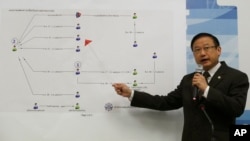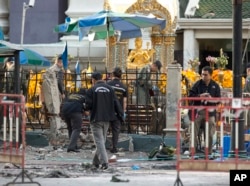The suspected mastermind of last month's deadly bomb attack in Thailand left for China from Bangladesh 12 days ago, and efforts in Malaysia to track the man suspected of planting the explosives have been unsuccessful, Thai police said on Friday.
No group has claimed responsibility for the Aug. 17 attack at a Hindu shrine in Bangkok, which killed 20 people, including 14 foreign tourists, among them seven from Hong Kong and mainland China.
The man Thai police believe organized the plot and fled on the eve of the blast spent two weeks in Bangladesh before taking a flight from Dhaka to Beijing on Aug. 30, Bangladesh police said.
"We checked his name, arrival date and passport number with the immigration department ... we found that it was correct and he left from the same airport [to Beijing]," A K M Shahidul Hoque, inspector general of Bangladesh police, told Reuters.
Hoque said the name on the passport was Abu Dustar Abdulrahman, adding his men were looking for the suspect's hotel.
China still investigating
In Beijing, Chinese Foreign Ministry spokesman Hong Lei said he was not aware if the suspect had flown to China from Bangladesh. "This case is still under investigation," he told a daily briefing.
Thai police have ruled out international militants as responsible for the attack but have not said why nor what they believe the motive was.
Thai police said on Friday the investigation had expanded to Malaysia.
Suchart Teerasawat, a police inspector general, told Reuters he was in Malaysia last week following a lead that a yellow-shirted man caught on a security camera leaving the bomb at the Erawan Shrine may have crossed Thailand's southern border.
"We have coordinated our efforts with the Malaysian police," he said, while adding he had no concrete information.
The investigation gained momentum after information was given by one of two detained suspects, who was arrested with a Chinese passport bearing the name Yusufu Mieraili.
He admitted to giving a bag containing the device to the bomber and said another man, Abu Dustar Abdulrahman who is also known as "Izan", had given orders to the plotters.
Thai police had tracked that man to Bangladesh.
Thai visas were issued in Kuala Lumpur to both men, according to a diplomatic source, using Chinese passports with names Abu Dustar Abdulrahman and Yusufu Mieraili, in October 2014 and February 2015 respectively.
The use of Chinese passports, at least one of which stated Xinjiang as a birthplace, adds fuel to speculation the bombing may have been a revenge attack by sympathizers of Turkic-speaking Uighur Muslims.
Thailand was widely condemned in July for forcibly repatriating 109 Uighurs to China, where they say they are persecuted. Many Uighurs from western China's Xinjiang region travel though Southeast Asia to get to Turkey. China denies persecuting Uighurs.






